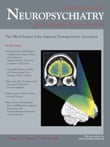Lithium Prophylaxis in Kleine-Levin Syndrome
To the Editor : Kleine-Levin syndrome is described as a triad of recurrent hypersomnolence, hyperphagia, and hypersexuality. 1 However, an incomplete presentation characterized by hypersomnia (which is mandatory for clinical diagnosis), with or without hyperphagia, hypersexuality, cognitive disturbances, mood symptoms, compulsive behaviors, and perceptual abnormalities has also been described. We describe a patient with a clinical diagnosis of Kleine-Levin syndrome and the favorable response to lithium.
Case Report
A 16-year-old girl presented with episodic hypersomnia for the previous 6 years. The episodes had an abrupt onset and occurred approximately once a month. The episodes lasted anywhere from 2 to 15 days. She would average about 20 hours of sleep in a day. She was observed by her family to be “dull,” less interactive, and was unable to attend school. During the episodes she used to unusually crave and demand carbohydrate food. Repeated questioning and seeking reassurance were also observed, and she was unable to recollect events that occurred during episodes. She had received treatment from the third episode onward with various drugs including risperidone, olanzapine, valproate, carbamazepine, topiramate, and clobazam (a benzodiazepine) without remission from the episodes.
Biochemical and endocrine parameters including CT scan of the brain were all normal. Polysomnography was attempted, but she did not cooperate for the procedure. The treatment team considered a clinical diagnosis of Kleine-Levin syndrome. Lithium in 300 mg tablets was initiated as a prophylactic agent; the dose was increased later to 750 mg/day (serum level: 0.8meq/liter). The patient has been on lithium regularly for 6 months and has not had any recurrence of hypersomnia or behavior changes so far. She has once again returned to school and has resumed her studies.
Discussion
An incomplete presentation is more common than the complete triad of hypersomnia, hyperphagia, and hyper sexuality. 2 Patients can appear depressed and suicidal during the episode, 1 and sometimes if the hypersexuality, social disinhibition, and behavioral dyscontrol predominate, they can mimic a manic episode as well. 3 Derealization, perceptual abnormalities, and paranoid delusions can also be a part of the clinical picture. There is significant response to lithium in preventing further episodes (relapses) when compared with medical abstention in patients with Kleine-Levin syndrome. 1 , 4 The therapeutic range of the response seems to be the same as required for prophylaxis of an affective disorder. Among stimulants, amphetamine reduced the sleepiness during episodes, but was not useful in preventing relapses. Various medications like antidepressants, antipsychotics, benzodiazepines, electroconvulsive therapy, L -dopa, other stimulants, and mood stabilizers have been used with limited success.
We would like to emphasize that this report should interest all physicians, neurologists, and psychiatrists. As reviewed above, Kleine-Levin syndrome can resemble psychiatric conditions. The case highlights the need for psychiatrists to be aware of Kleine-Levin syndrome and the treatment options available once diagnosed. This case also illustrates the efficacy of lithium in preventing relapses in patients with Kleine-Levin syndrome.
1 . Arnulf I, Zeitzer JM, File J: Kleine–Levin syndrome: a systematic review of 186 cases in the literature. Brain 2005; 128:2763–2776Google Scholar
2 . Sheldon SH: Kleine-Levin syndrome and recurrent hypersomnias, in Principles and Practice of Pediatric Sleep Medicine, 1st ed. Sheldon SH, Ferber R, Kryger MH. Elsevier Health Sciences, 2005Google Scholar
3 . Masi G, Mucci M, D’Acunto G: Klein-Levine syndrome mimicking a manic episode. J Am Acad Child Adolesc Psychiatry 2007; 46:551–552Google Scholar
4 . Filippo M, Bertini N, Gabriele MI: Efficacy of lithium treatment in Kleine-Levin syndrome. Eur Psychiatry 2002; 17:232–233Google Scholar



